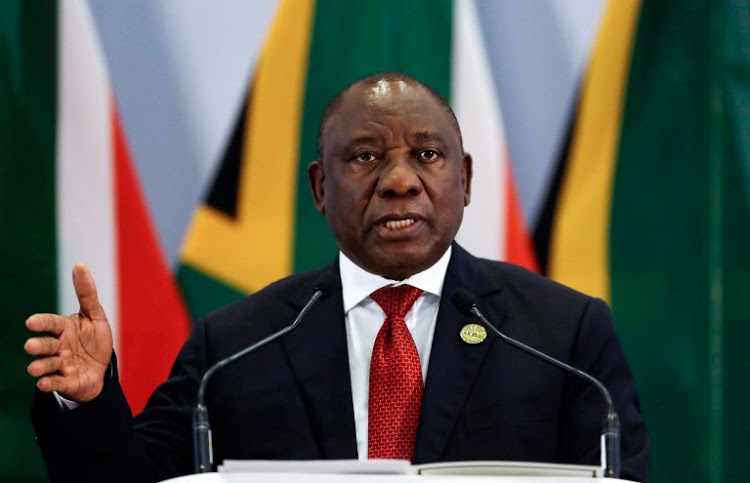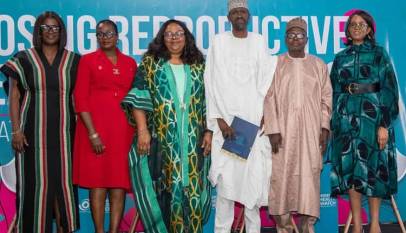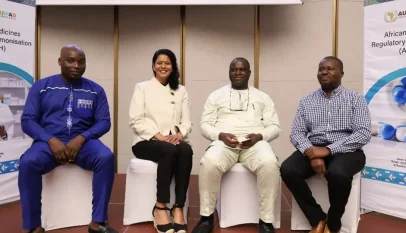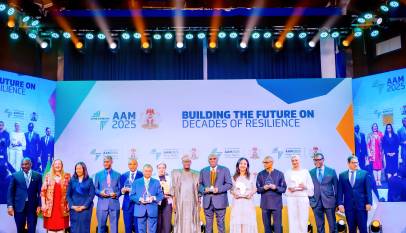OP-ED | Testing the relationship: China’s ‘Corona diplomacy’ in Africa, By Lidet Tadesse
As the coronavirus pandemic puts an accent on the geopolitical dynamics among powerful states, China has stepped up its support to Africa’s fight against the virus – arguably not only out of magnanimity. Although China’s assistance is very welcome on the continent at the moment, more is on its way to test China-Africa relations, such as negotiations on debt relief.

The global response to the novel coronavirus brought to the surface geopolitical tensions and geopolitical competition between China, the EU and the US predating the epidemic. There are signs of this in President Trump referring to COVID-19 as the ‘China virus’, Iran’s complicated access to international support as well as global markets for medical supplies due to US sanctions. The tension could also be seen in the irony of Chinese solidarity missions to Italy at the height of the crisis there, while some European countries had by then temporarily banned exporting personal protective equipment (PPE) and essential medical supplies, and in the US’ withdrawal of funds to the World Health Organization (WHO), following its accusations that the WHO Director-General has been subservient to China at the onset of the outbreak.
China’s role in the global response to COVID-19 and the support it extends at the bilateral and multilateral levels are tied to its domestic and international interests. Its international ‘mask diplomacy‘ is scrutinised and there is a debate on whether or not it will succeed in enhancing its international standing to become a superpower. The debate withstanding, one of the regions where China has made various visible and much-needed contributions to the fight against the epidemic is Africa. The spread of the virus on the continent is still relatively low and many African countries have taken strict measures to prevent an outbreak. To support these ongoing efforts, the Chinese government has for example provided PPE to 18 countries mostly in West Africa, sent a medical team to Ethiopia and Algeria, and provided (virtual) technical and medical advice to Mozambique on diagnosing and treating COVID-19. China’s private sector has also been at the forefront of the continental fight against corona, the most visible support being from the Jack Ma Foundation, which provided three rounds of medical equipment and supplies to all African countries at the coordination of the Africa Centres for Disease Control and Prevention (CDC). The last round included 4.6 million masks, 500,000 swabs and test kits, and 300 ventilators among other things.
Why China’s assistance to Africa stands out
Be it part of its latest global ‘Corona diplomacy’ or a continuation of its strategic partnership with Africa, China’s contribution to African efforts against the epidemic is of course welcome. In addition, the manner in which this support is extended stands out from the rest and emboldens China’s geopolitical image in Africa for two reasons.
First, China’s support to African countries is primarily in-kind rather than in cash. The global market for PPE and medical equipment is overwhelmed and is undergoing steep price bidding, price gouging and there have even been incidents of state seizure, re-direction and inexplicable disappearance of internationally procured goods. Many countries in Africa can neither offer competitive bids in the aggressive market for PPE and medical equipment nor can all manage the logistical and administrative aspects of procurement at scale.
Given that even developed nations with considerable capacity for procurement are struggling to acquire PPE and ventilators to respond to the crisis, China’s in-kind assistance is much needed. While the Africa CDC will now coordinate the continent’s pooled procurement through a new initiative launched at the end of March, the delivery of actual medical equipment and PPE, particularly at the onset of the outbreak of the virus, was targeted and practical assistance yet to be matched by other external partners.
The EU’s COVID-19 assistance to Africa, for example, is largely financial and focuses on fund reallocation rather than on new fund mobilisation. The EU will reallocate €3.6 billion for the fight against the coronavirus in Africa. This in-cash assistance too is needed and will certainly serve a purpose. But the volume of EU’s financial assistance falls short of making a geopolitical impression and displaying the EU’s own ambitions in Africa, unless it will be complemented by other types of support in the areas of debt relief, access to liquidity, diagnostics and therapeutic research, for which the continent is galvanising international support.
Secondly, China’s support to Africa is appealing because it is based on China’s ‘demonstrated experience’ in containing the virus in its own territory. China has been criticised for silencing the early signs of the outbreak, being opaque in its documentation and data sharing, the cost of its response on civil liberties and engaging in a propaganda war with the West. The point remains, however, that China positions itself as an experienced external partner which extends support from a point of proven – albeit contested –experience.
Although the credibility and reception of this projection are subjective and vary, this imagery is appealing because it somehow runs contrary to how assistance is often afforded to Africa from well-meaning yet uninformed actors, who are parachuted in to solve problems they only have presumed expertise in. The grave and unanticipated human cost of the virus in Europe and in the US casts a shadow on the image of the ‘West’ as the invincible or otherwise ever competent, ever ready global player that can respond to any disaster, owing to ‘strong institutions’, ‘deep-rooted democracy’ and ‘robust economy’. China, therefore, provides technical and practical assistance from a position of strength and can further its partnership with Africa in a strategic manner.
But it’s not all roses and rainbows
China’s political motive and geopolitical ambitions behind its support are of course not lost on African states. Not everyone buys China’s positioning as a forerunner in South-South solidarity, neither is its multifaceted assistance always welcome. For example, there was the push back from Nigerian scientists against the deployment of an 18-member Chinese medical team. Nigeria questioned the need for foreign expertise given unemployed and underemployed Nigerian practitioners in the country, and interrogated the prudence in “bringing foreigners who aside from national security concerns may not be conversant with our culture, terrain and peculiar challenges”. Given recent global competition among various countries and pharmaceuticals over access to African genomic data, there is a concern that China’s medical assistance to African countries has other motives than benevolence, and that the pre-existing China-US rivalry in this regard might have implications for the financing of the Africa CDC.
The depth and quality of China’s partnership with Africa are also now being put to test following reports of systematic discrimination of Africans and visible racism towards black people in Guangzhou city in China in the past weeks. Clearly, this tarnishes China’s image as a Southern partner in solidarity with Africa and its citizens. Africans have taken to social media to campaign for diplomatic action against China and have launched initiatives to airlift Africans out of China. This has stirred African governments and the African Union Commission to speak out, but no consequential diplomatic action has been taken by African governments to date against the Chinese government for its complacency.
The proof of the pudding…
Moreover, as African countries call attention to debt relief and moratorium as a mechanism to support African economies cope with the economic fallout that’s predicted in Africa, the debt owed to China will inevitably become centre stage. Africa has sent a funding target of $100-150 billion for economic recovery. In a letter to the G20, the Ethiopia Premier Abiy Ahmed reminded leaders that the global fight against COVID-19 cannot afford to overlook Africa. This appeal has been resounded by the President of South Africa and current chairperson of the AU, Cyrill Ramaphosa, who also appointed four special envoys to galvanise global support for Africa, particularly to contain the economic cost of the pandemic, while AU member states replenish the continental anti-COVID-19 Fund. G20 countries have now agreed to freeze the debt servicing for several African countries, although Africa continues to call for longer time horizons for debt repayment and even blanket debt cancellation for the continent’s low- and middle-income countries, so that governments can direct resources to respond to the virus.
China’s take on debt is however contentious and it is not yet clear how it will help contribute to Africa’s economic recovery. China holds roughly 20% of debt in Africa, much of which is concessional and commercial. In line with Africa’s global appeal for debt forgiveness and moratorium, China has expressed its openness to negotiation with African countries bilaterally rather than collectively. This approach comes in contrast with the expectation and possible negotiation position of the AU, which would like to see a blanket examination of African debt owned by China. Further, current analysis on this suggests that China is unlikely to unilaterally cancel debt without others doing the same, or apply measures on concessional and commercial loans (which constitute the majority of debt owed to China), and is less likely to go for a blanket debt cancellation or moratorium. How Africa approaches its negotiation with China on debt relief and how China will respond to the request, would not only affect China’s image in Africa, but it can also significantly impact Africa-China relations after the Corona crisis.
Overall, Chinese diplomacy with regards to responding to COVID-19 in Africa should be appreciated as an extension of China’s long-standing and recently revived partnership with Africa. Recent incidents such as xenophobic attacks of Africans in Guangzhou city in China, as well as long-standing issues such as debt relief, tarnish China’s image in Africa and put Chinese-Africa relationship to a test. But it remains to be seen if these issues represent short-lived hiccups or if they will have long-lasting effects on China-Africa economic and diplomatic relations. Similarly, it remains to be seen if and how the global geopolitical order will have changed by the end of this pandemic, and what this will mean for Africa’s global standing and its partnership with China.
This opinion article was originally published on EPCDM; the views expressed in it are those of the author – they do not necessarily represent African Newspage’s editorial policy













